Our top 23 of 2023

A year of impact
In 2023, alternative proteins began to break through and take their place at the global table for conversations about climate change, global health, and food security.
Before we start a new year of work catalyzing the alternative protein sector, we’re taking a moment to celebrate the good food progress across science, policy, and industry that our global community made possible over the past year.
23. The Indian government announced support for alternative proteins
GFI India secured a major win in July when continued engagement with the Indian government led to the inclusion of alternative proteins as one of six key priorities for its Ministry of Science and Technology. The Ministry’s Department of Biotechnology later revealed plans to create a National Biomanufacturing Policy with alternative proteins as a critical focus area.
22. GFI Europe partnered with EIT Food to invest in cultivated meat research
GFI Europe directed almost €2 million in funding from EIT Food, the world’s largest and most dynamic food innovation community. In 2022, GFI Europe collaborated with EIT Food to launch the Cultivated Meat Innovation Challenge, which awarded funding to projects that proposed promising solutions for driving down cultivated meat production costs—the winning projects received €100,000 each, and this year, they went on to unlock four times as much follow-on funding.
21. GFI Israel took the lead at the nation’s largest environmental conference
At the 51st Annual Conference for Science and the Environment in Israel, we hosted a plenary session featuring GFI Israel CEO Nir Goldstein, international food security experts, and representatives from the US Embassy and the Israeli government.
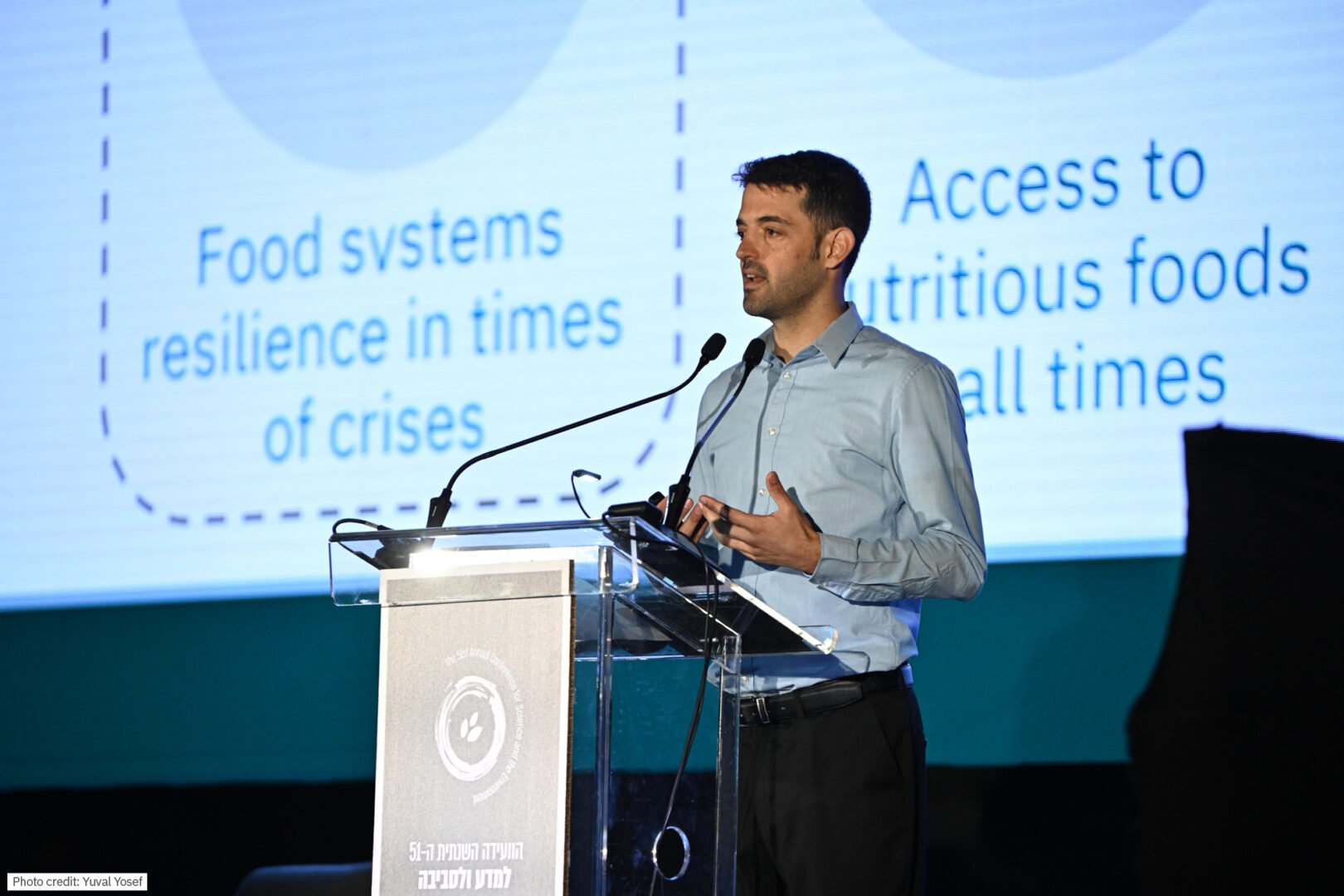
“There is a mission knocking on our door. We have the responsibility as a nation to solve the climate crisis, and that cannot be done without alternative proteins.”
Gideon Behar, Special Envoy for Climate Change and Sustainability in the Ministry of Foreign Affairs
20. GFI Brazil developed a crucial tool for the alternative protein sector
Since 2019, GFI Brazil has been working on a Brazilian Regulatory Framework for the alternative protein sector, strategically convening policy, science, and industry leaders to share ideas and insights. In 2023, Brazilian regulatory bodies opened the main frameworks for public consultation, signaling a major step toward formal adoption and implementation.
19. GFI worked with the U.S. Department of Energy to support alternative protein companies
In our role as a convener, GFI partnered with the U.S. Department of Energy (DOE) to share funding opportunities with the alternative protein industry. Since the spring, alternative proteins have been in scope for support from Department of Energy programs focused on decarbonizing the food and beverage sector. In September, we hosted a webinar with Rep. Julia Brownley’s office on using the DOE’s Loan Guarantee Program, providing crucial information for alternative protein companies on opportunities for securing financing as they scale up.
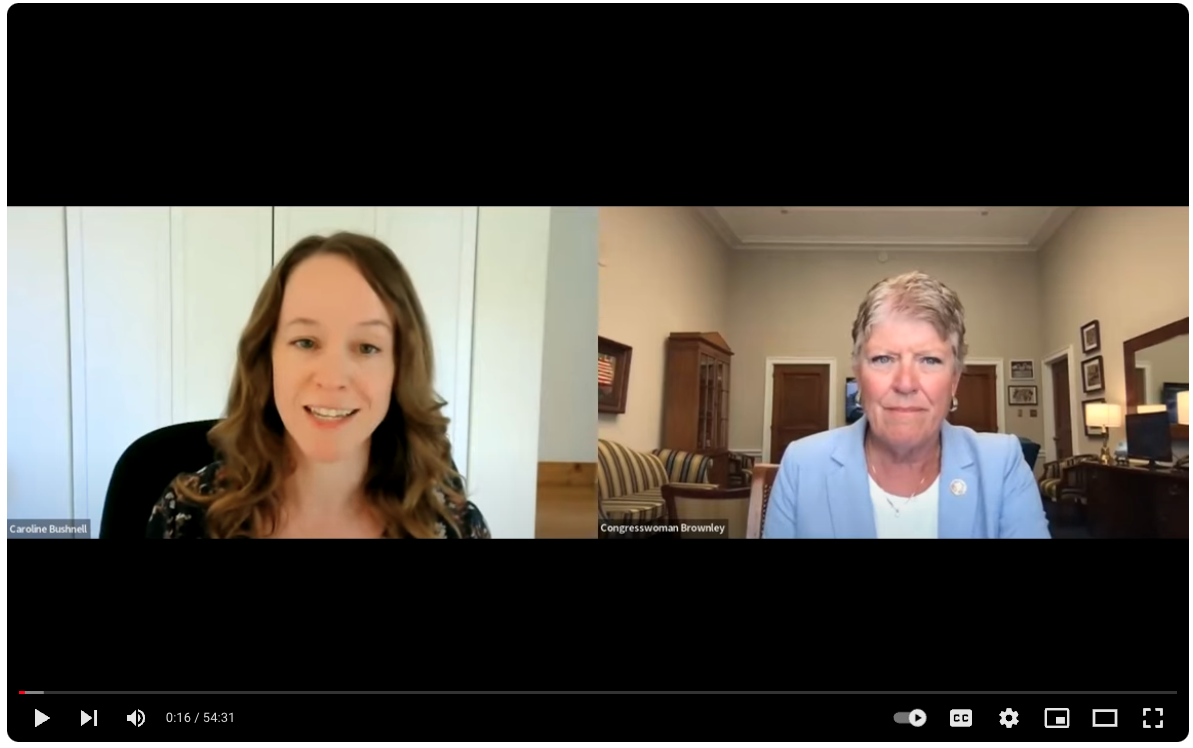
“If we want the United States to be the leader in the development of alternative proteins, we’ll need even more investment.”
Rep. Julia Brownley speaking at GFI’s webinar with the Department of Energy
18. GFI Asia Pacific made strides toward halal approval of cultivated meat
GFI Asia Pacific provided technical presentations and industry insights to halal certification leaders, prompting Shariah scholars in Saudi Arabia to share guidance on how to make cultivated meat halal.
17. GFI India convened Smart Protein Forum meetings to catalyze the science of alternative proteins
GFI India’s Smart Protein Forum brings together experts from leading research institutions and government bodies to advance alternative protein research. Government scientist Dr. Niloo Srivastava from India’s Ministry of Science & Technology delivered the inaugural address at the second forum meeting in July, in which she announced the formation of a Sectorial Committee for Smart Protein under the government’s biomanufacturing initiative.
16. GFI Europe influenced the EU Protein Strategy
Launched by the European Commission to decrease reliance on imported feed and diversify protein production in light of the war in Ukraine, the EU Protein Strategy has been a key focus for GFI Europe in shaping alternative protein policy across the region. We influenced a crucial European Parliament report intended to guide this strategy, successfully removing a provision that could delay cultivated foods coming to market and securing several mentions of plant-based and cultivated proteins.
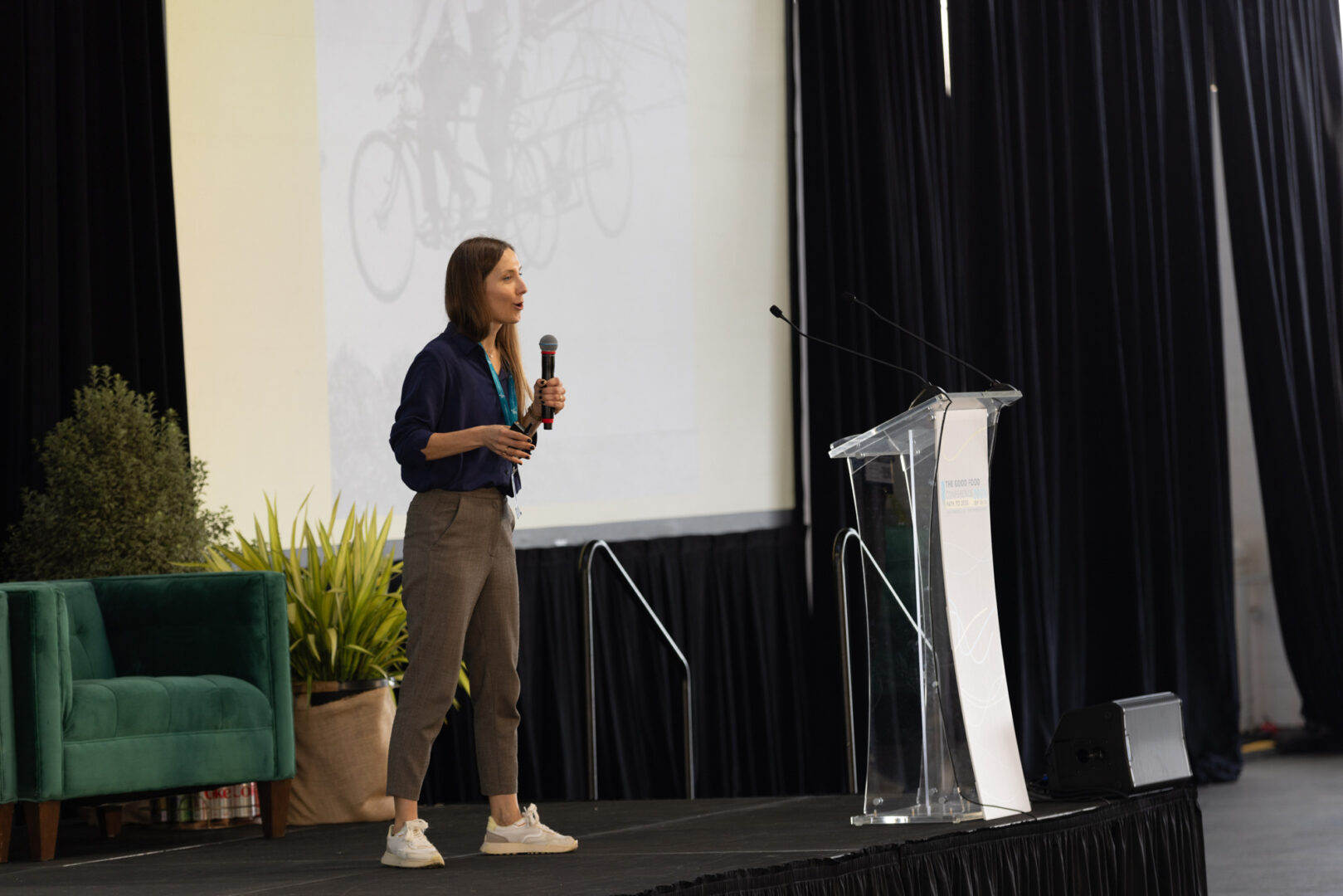
15. GFI’s Entrepreneur in Residence Program supported new solutions
Designed to address alternative protein whitespaces and nurture talent, GFI’s first-ever Entrepreneur in Residence (EIR) Program received more than 130 applications. Inaugural EIR Deimena Drąsutytė, founder of HERlab, collaborated closely with GFI over nine months on team-building, market research, funding, and forming industry partnerships, resulting in HERlab winning $525,000 in grants, securing lab space at the University of Kent, and expanding their team.
14. GFI Asia Pacific helped the sector skill up with plant-based training programs
This year, six universities and organizations joined GFI Asia Pacific to begin crafting a new work-study training program to tackle the shortage of skilled workers in the plant-based meat sector. Recent graduates and mid-career professionals in the program will have the chance to prepare for three main job roles within Singapore’s plant-based food industry and gain expertise in plant-based meat processes, development, and operations.
13. GFI Brazil shared valuable food safety expertise across the industry
GFI team members in Brazil and the United States played a key role in the Food and Agriculture Organization of the United Nations (FAO) report on the food safety of cultivated meat. GFI Brazil also worked with academic and industry partners to publish a food safety study for cultivated meat production, and GFI Brazil sci-tech specialist Graziele Bovi, Ph.D., was invited to participate in the Food Safety Foresight Technical Meeting on New Foods and Production Systems at the FAO.
12. GFI launched the fifth cohort of our Research Grant Program
Funding the first stage of critical open-access alternative protein research, GFI’s 2023 Research Grant Program invited proposals in four priority topic areas strategically identified by our science and technology team. We received 197 proposals from 37 countries, and the total funding requested was $54.7 million, a 68% increase over last year—indicating the increased interest in (and need for) funding for foundational alternative protein research.
11. GFI India hosted the flagship Smart Protein Innovation Challenge
Supporting startups and addressing the shortage of skilled professionals in the sector accelerates innovation, which is why GFI India’s flagship India Smart Protein Innovation Challenge is vital to the region’s alternative protein success. In 2023, over 200 innovators from 80 Indian cities participated in the five-month program, gaining access to valuable resources, mentorship, and events focused on advancing solutions for the industry.
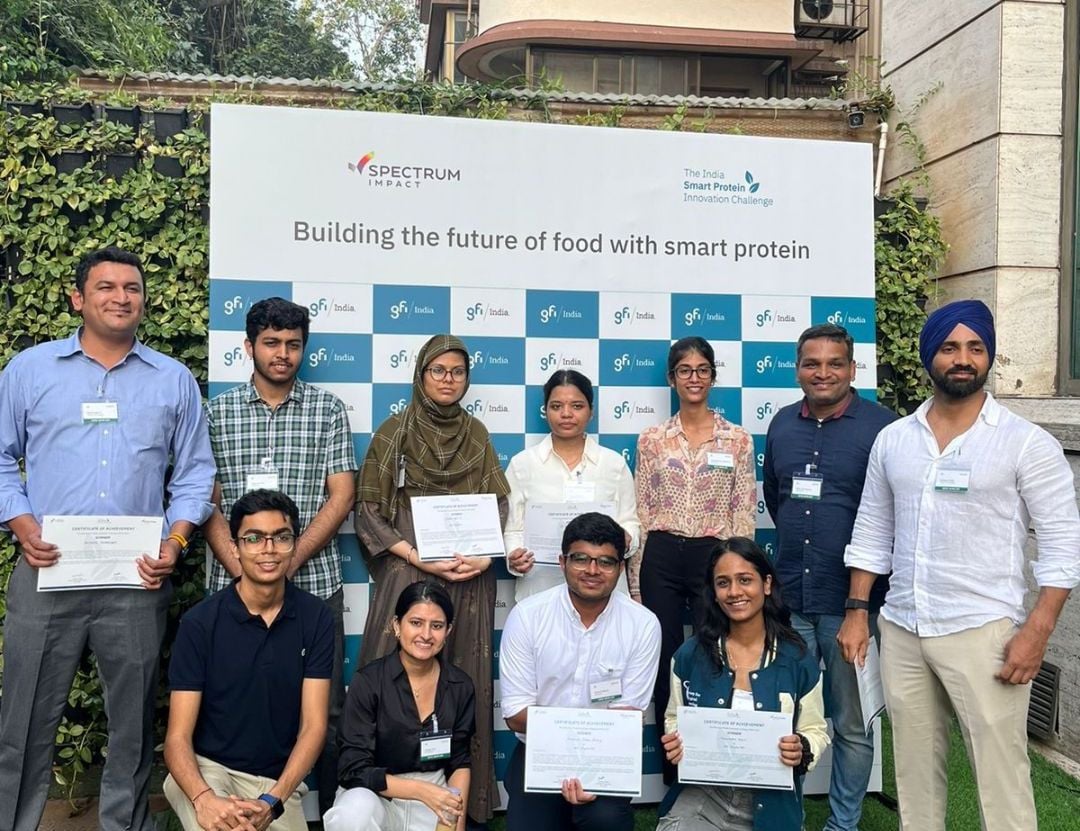
10. GFI Israel and the Technion established a new research center
In partnership with the Technion, a leading Israeli research university, GFI Israel launched the $20 million Sustainable Protein Research Center (SPRC), a groundbreaking hub uniting 30 researchers from 10 departments to advance plant-based and cultivated meat. GFI Israel will continue to serve as the Technion’s strategic partner throughout the SPRC’s establishment process.
9. The Biden Administration put a spotlight on alternative proteins
The groundbreaking “Bold Goals for U.S. Biotechnology and Biomanufacturing” report, released in March by President Biden’s administration, compiles recommendations from five key executive agencies and outlines a strategic vision for the American bioeconomy. Both the U.S. Departments of Agriculture (USDA) and Energy highlighted alternative proteins as crucial elements in the future of biotechnology and proposed measures to support research and development, commercialization, scale-up, and public-private partnerships.
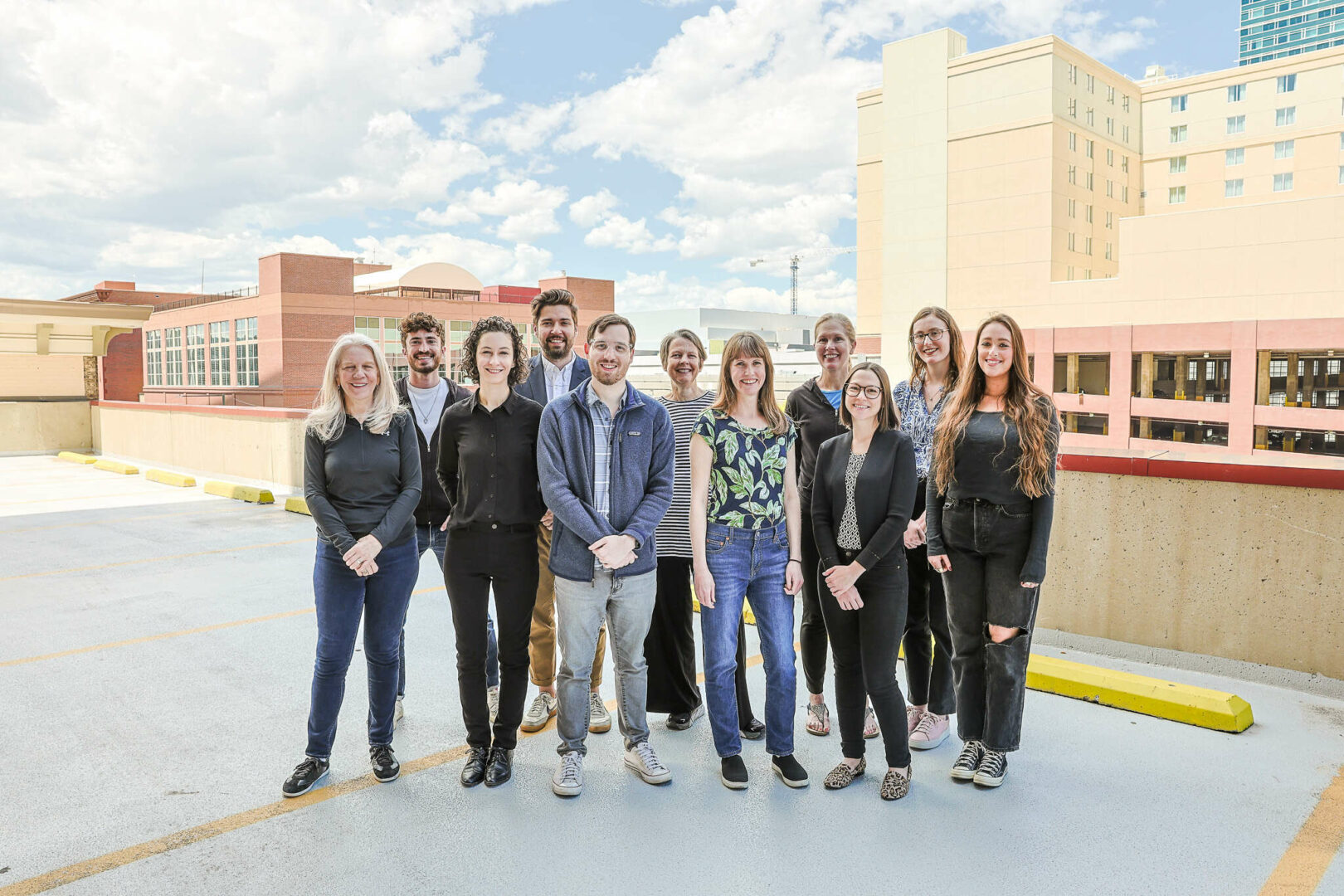
8. The UK and German governments made major investments in alternative proteins
Thanks to GFI Europe’s relationship-building efforts, the UK government made its two largest investments in alternative proteins to date: UK Research & Innovation’s Engineering and Physical Sciences Research Council awarded £12 million to the University of Bath’s Cellular Agriculture Manufacturing Hub, and the UK’s Biotechnology and Biological Sciences Research Council (BBSRC) invested £15 million in creating an Alternative Proteins Innovation and Knowledge Centre.
In 2023, GFI also launched the first State of the Industry Report on the German alternative protein ecosystem and engaged with the Bioeconomy Council—and in November, the German parliament paved the way for a €38+ million investment in the protein transition in 2024.
7. GFI Asia Pacific created a new platform for novel food regulation
GFI Asia Pacific worked with the APAC Society for Cellular Agriculture to create the APAC Regulatory Coordination Forum, a platform that convenes companies, industry groups, think tanks, government bodies, and food regulators to establish consistent regional regulations in the Asia Pacific region. The new platform launched at Singapore International Agri-Food Week, where signatories from Australia, China, India, Indonesia, Israel, Japan, Malaysia, Singapore, and South Korea endorsed a memorandum of understanding to help facilitate approval processes for alternative proteins.
6. GFI produced and amplified expert research and resources
This year, we published rigorous analyses and data-driven reports that amplified key findings and catalyzed alternative protein research.
Our reports
- GFI’s annual suite of State of the Industry Reports offers the most comprehensive and authoritative analyses of the alternative protein landscape. This year, we also released the first-ever Japanese translation of these reports, and GFI India and GFI APAC also launched inaugural State of the Industry reports in their respective regions.
- Our second State of Global Policy Report offered a comprehensive overview of the policy landscape that analyzes public investments in alternative proteins around the world, which have now likely surpassed $1 billion.
- We published a detailed life cycle assessment guide tailored for alternative protein producers, a sidestream analysis identifying commodity crop “waste” that can become inputs for alternative protein production, a needs assessment on building an inclusive alternative protein workforce, and many more resources to nourish and grow the research and training ecosystem.
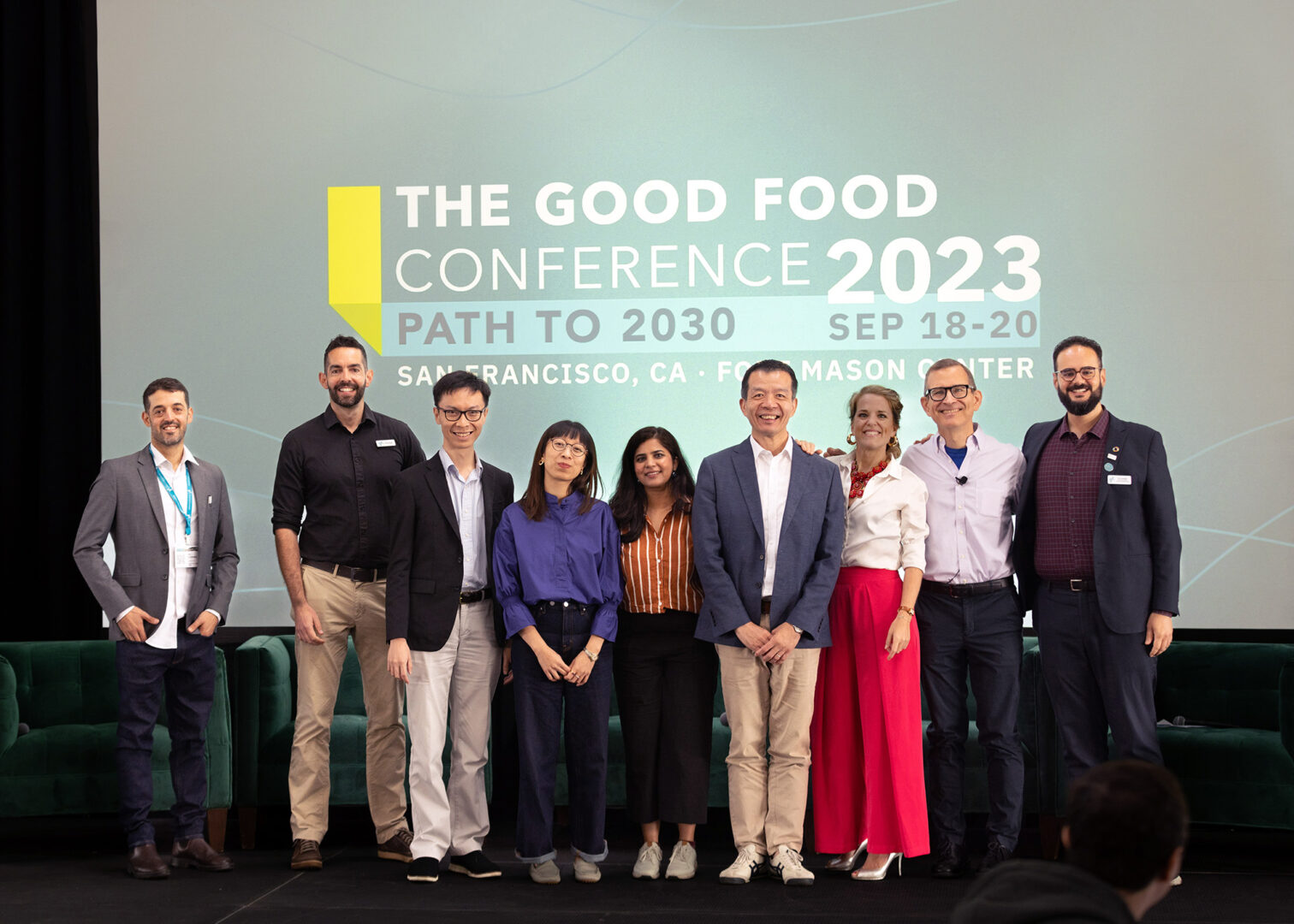
5. GFI’s Good Food Conference connected and inspired food system leaders
GFI’s 2023 Good Food Conference brought together more than 1,200 innovators, scientists, industry leaders, philanthropists, and global champions committed to food system transformation. Conference sessions featured some of the largest meat and food companies in the world, the U.S. Departments of Agriculture and Energy, members of Congress, state elected officials, visionaries from top research universities, and a pitch slam for new alternative protein companies.
“We came away from the Good Food Conference with the optimism that despite all the challenges the industry faces, there are already tangible innovations on the horizon. We feel even more reinvigorated by the passion and ingenuity of the people working in this field.”
CP Foods, 2023 Good food conference Sponsor
4. The Alt Protein Project expanded to universities around the world
GFI’s Alt Protein Project (APP) movement empowers students to turn their universities into hubs for alternative protein innovation and education. For the APP’s 2023 cohort, we received over 50 applications from around the world and were thrilled to welcome 24 new groups across 11 countries, including our first chapters in Brazil, Japan, Malaysia, Portugal, Switzerland, and Turkey—bringing the total number of APP chapters to 53.
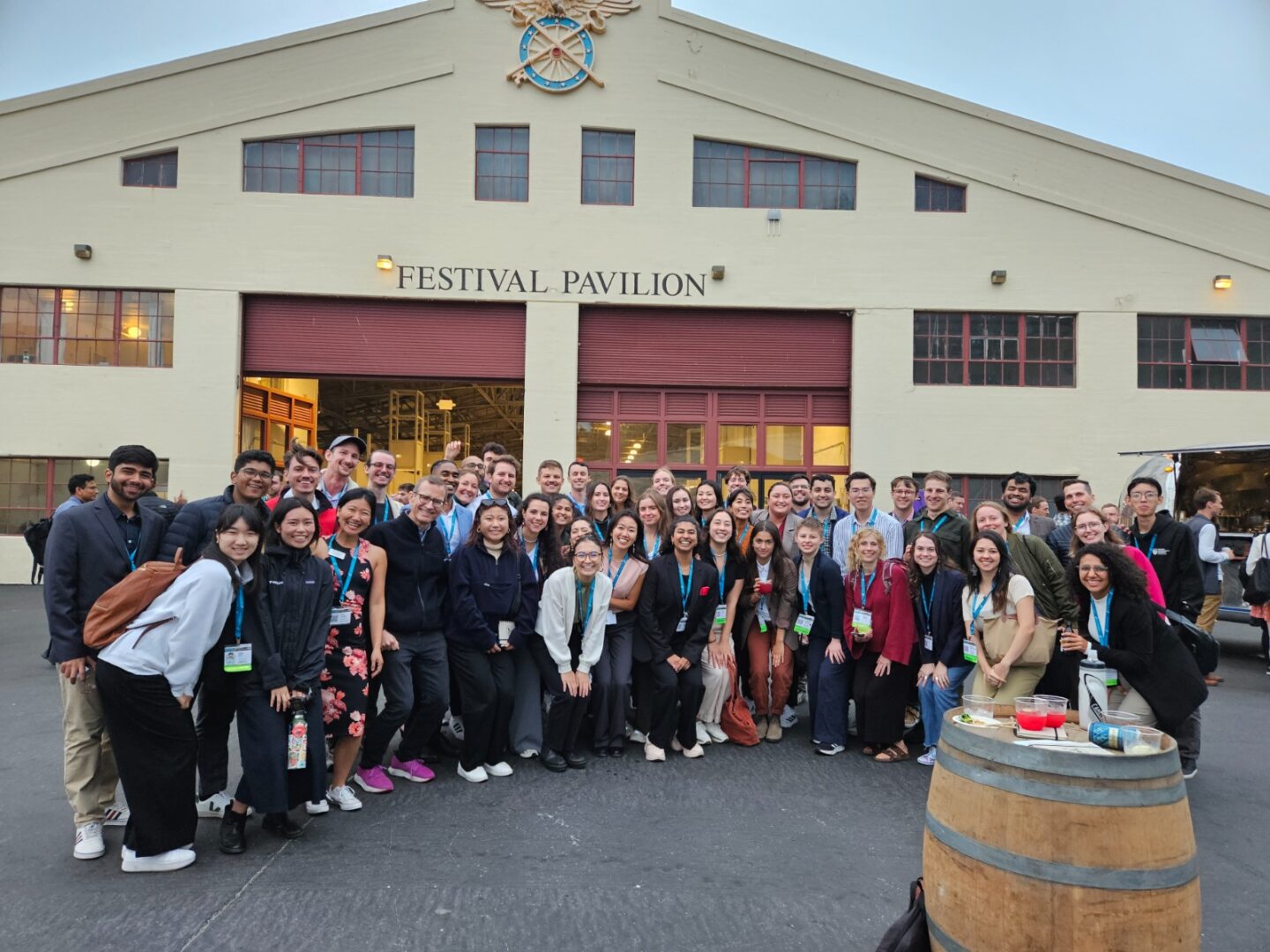
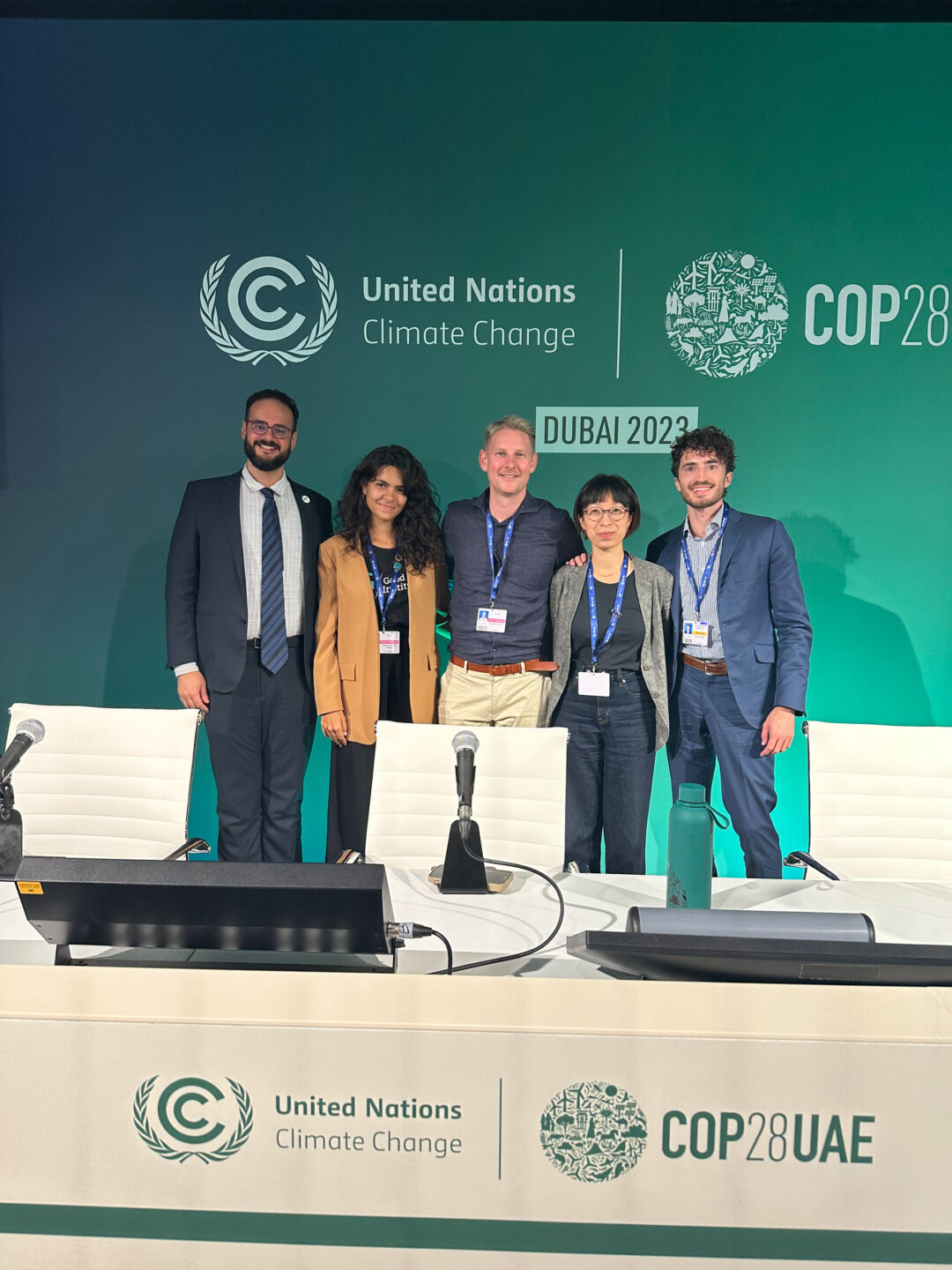
3. GFI elevated alternative proteins on the global stage
Here are just a few of the events where our global teams had a presence this year:
- COP28 was the largest climate conference of the year, placing food at the center of the conversation for the very first time. GFI’s presence spanned our affiliate organizations as we worked to position alternative proteins as an essential climate solution. We were proud to join 200 non-state actors, including farmers, frontline communities, businesses, philanthropists, and cities, in signing a call to action seeking food system transformation and highlighting the need to diversify the global protein supply.
- GFI championed the role of alternative proteins in climate-smart agriculture at the AIM for Climate Summit, where we co-organized a private ministerial dinner with the governments of Brazil and the Netherlands for high-level officials.
- GFI was on the ground during an action-packed Climate Week NYC, where discussions on alternative proteins were infused into several high-profile sessions.
2. Alternative proteins were highlighted as a solution to the world’s most urgent challenges
Food system change is playing an increasingly important role in prominent conversations around climate change and other challenges facing our planet.
In 2023, alternative proteins were highlighted in pivotal reports
- Mitigating Risk and Capturing Opportunity: The Future of Alternative Proteins: The Center for Strategic and International Studies, a leading policy think tank, called for increased government investment in alternative proteins to address food security, global health, climate change, food systems resilience, and global competitiveness.
- What’s cooking?: An assessment of the potential impacts of selected novel alternatives to conventional animal products: After nearly two years of work, the UN Environment Programme released this major report at COP28 focused solely on alternative proteins as a climate solution. Several GFI team members were tapped to help author and review the report, which validates GFI’s theory of change and highlights the need for public funding and appropriate regulation to ensure alternative proteins reach taste and price parity.
- Charting Asia’s Protein Transition: This report by Asia Research & Engagement outlines how rapidly Asian countries must transition their protein production to hit climate targets.
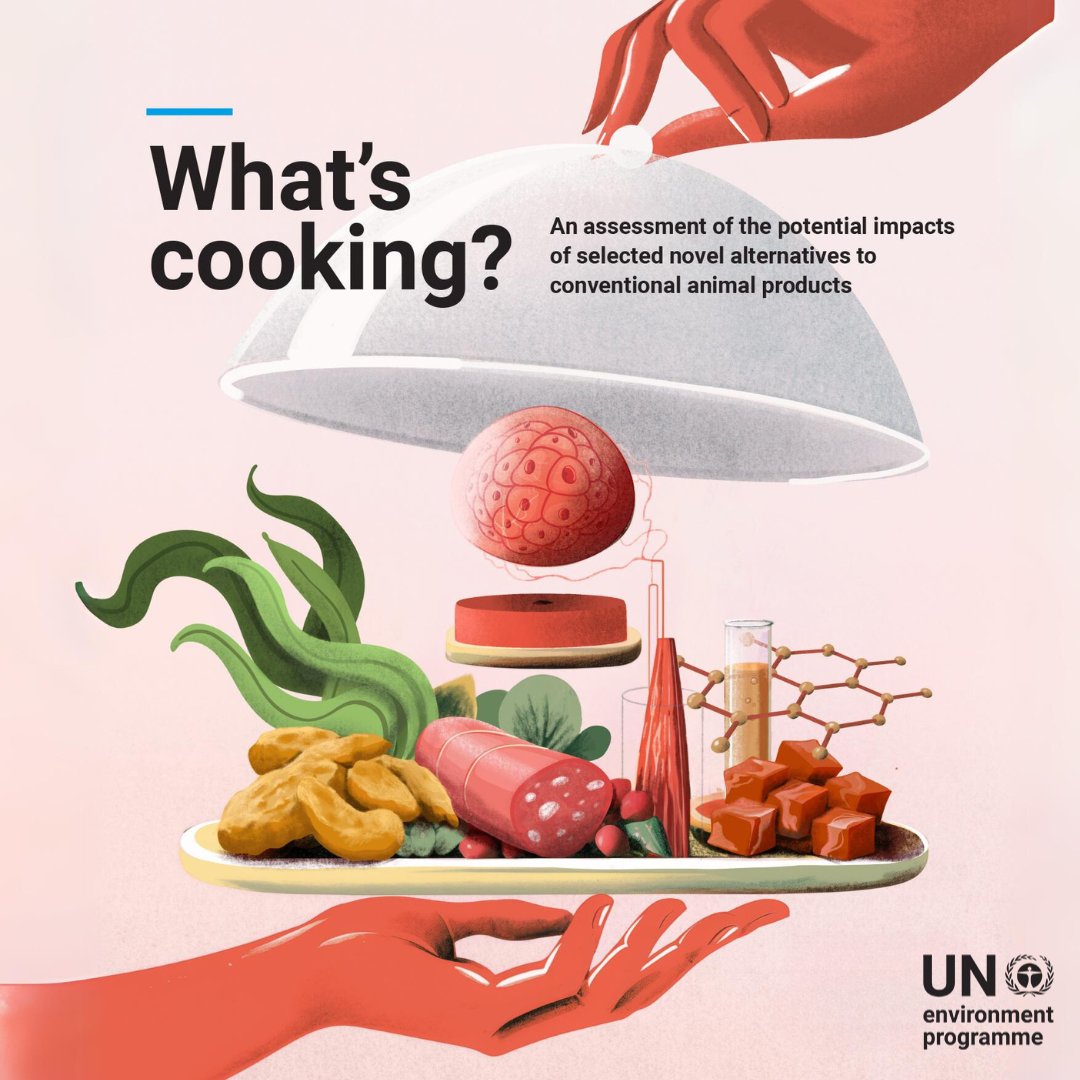
1. Cultivated meat was approved for sale and served at restaurants in the world’s largest economy
Before 2023, the only place you could buy cultivated meat was Singapore. But on June 21st, both UPSIDE Foods and GOOD Meat obtained Grants of Inspection from the USDA, the final regulatory hurdle for cultivated meat to be officially approved for sale in the United States. Soon after, cultivated chicken was served by two of the most respected chefs on the planet, Dominique Crenn and José Andrés. Our perspective on this watershed moment for the industry was included in most top media stories covering the news, from CNN and NPR to The New York Times and Time Magazine.
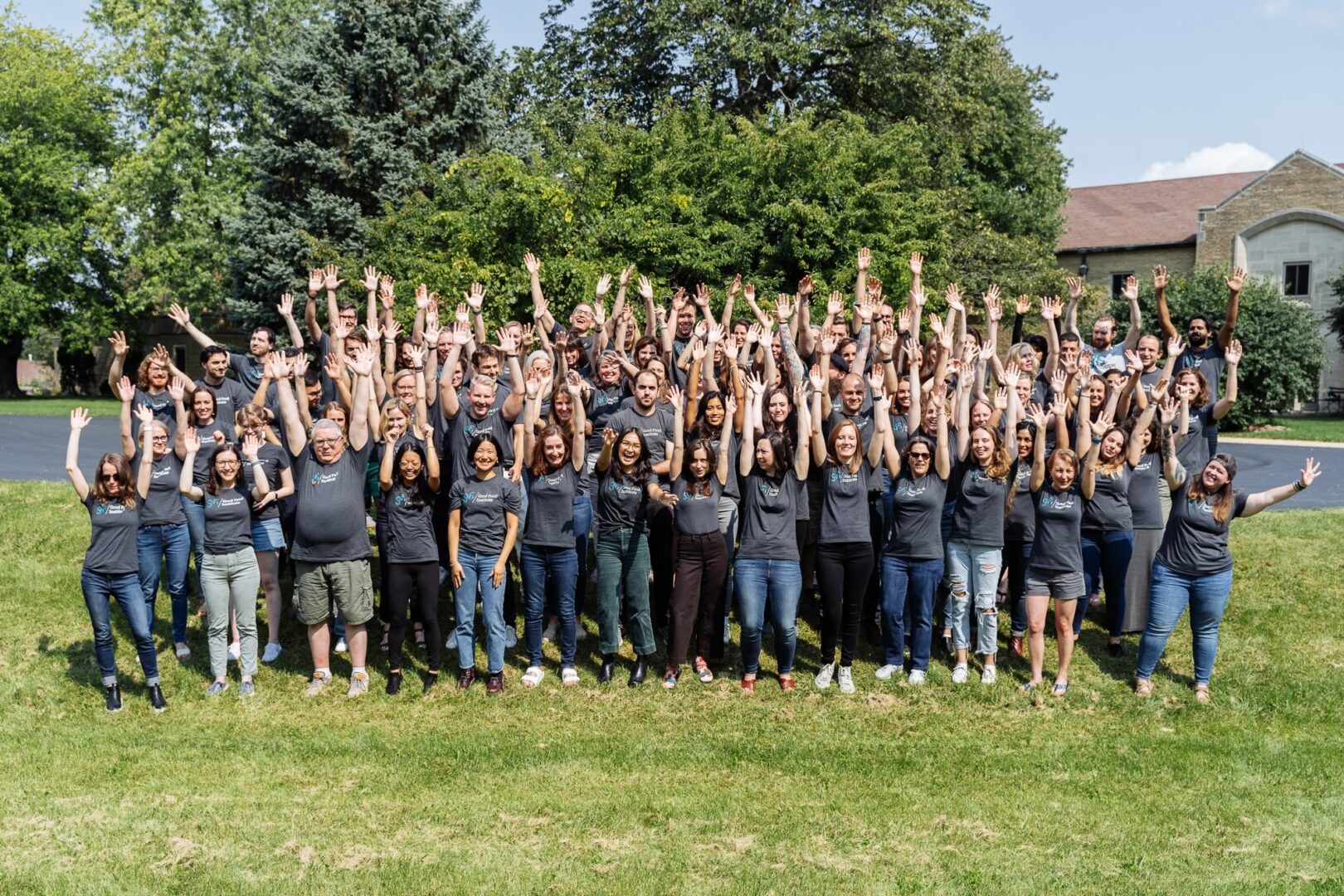
Join the community making this change possible
A global community supports our work to transform our food system, and our journey is just getting started. In every region where we operate, our activities and impact are shifting the future of food to benefit the planet, people, and animals.
We’re grateful to be recognized as a highly effective charity by Giving Green, Charity Navigator, Animal Charity Evaluators, and Founders Pledge. These evaluators endorse our work because we are advancing high-impact solutions to the world’s most urgent problems. The steps we take now are critical: the biggest challenges are still ahead of us, and we must work together to reimagine a different future of food.
Our global community is ready to create the change we know is possible.

